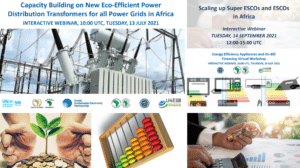Between July and September 2021, United for Efficiency and the AfDB (African Development Bank) partnered to run three workshops aimed at energy efficiency stakeholders across Africa, including policymakers, public procurement personnel and representatives of standards organisations, power utilities, national and regional electricity regulatory authorities and energy entities.
 Held in collaboration with the regional sustainable energy centres from Africa, EACREEE, ECREEE and SACREEE, and the Association of Power Utilities of Africa (APUA), these webinars discussed technical aspects of new eco-efficient power distribution transformers, policy and regulatory good practices and tools, and novel financial mechanisms, such on-bill financing, energy service companies (ESCOs) and the Super ESCO concept as an innovative and sustainable mean to scale up investments in energy efficiency projects in the public and private sectors.
Held in collaboration with the regional sustainable energy centres from Africa, EACREEE, ECREEE and SACREEE, and the Association of Power Utilities of Africa (APUA), these webinars discussed technical aspects of new eco-efficient power distribution transformers, policy and regulatory good practices and tools, and novel financial mechanisms, such on-bill financing, energy service companies (ESCOs) and the Super ESCO concept as an innovative and sustainable mean to scale up investments in energy efficiency projects in the public and private sectors.
Each webinar ran for 180 minutes, with presentations from key stakeholders from the sector, such as the International Cooper Association, Hitachi ABB, the Indian consultancy firm Idam, APUA, the International Energy Agency, ECONOLER, the Global ESCO Network, and local energy agencies, such as the Senegal Agency for the Economy and Control of Energy (AEME), the Tunisian National Agency for Energy Management (ANME), the South African National Energy Development Institute, and the Ghana Energy Commission among others, as well as AfDB and United for Efficiency.
Each session had more than 80 attendees from the region and served as a interactive platform for participants to actively participate – asking questions, requesting additional information, providing suggestions and sharing their point of view on the actions needed for the development and implementation of high efficiency transformers in Africa and their challenges to advance the market transformation to more energy efficient equipment.
Grid stability, energy security and energy access are pressing issues in many African countries, and distribution and transmission losses from elderly, inefficient equipment add additional pressure to already strained networks. Research has shown that around 5% of all electricity generated is lost due to inefficient transformers, and that a transition to energy-efficient transformers in all five regions in Africa could save 2.2 TWh/year, worth 190 million USD, by 2030, with an associated reduction in CO2 emissions of 1.9 million tonnes yearly. This equipment was therefore chosen as the topic of the first webinar to help the audience to:
- Understand the life cycle cost of distribution transformers and the importance of energy efficiency.
- Learn about current fiscal and financial mechanisms and incentives to support adoption of higher efficiency distribution transformers.
- Discuss the opportunities and means for long-term national/regional market transformation programmes for appliances and equipment, including more efficient power distribution transformers.
The second webinar focussed on energy-efficient equipment and appliances more broadly, with the objective of helping African countries leapfrog to super-energy-efficient alternatives through the update of policies and regulations (particularly, minimum energy performance standards and labels), and facilitating the sharing of experience and success stories on the development and implementation of sustainable and innovative mechanisms currently under implementation by international and local partners and organizations. It provided the audience with:
- Details on current financial and policy incentives, as well as implementation arrangements to support adoption of high energy efficient appliances and equipment.
- An exchange of experience on tools and best practice, especially on-bill financing, as well as information on successful energy efficiency market transformation programmes in Africa and the lessons learned by the decision makers and energy efficiency agencies in implementing these programmes.
- An understanding of the tools available from U4E and how these can be adapted by each country to help accelerate market transformation of energy-efficient and climate friendly energy-efficient technologies, such as the Model Regulation Guidelines, which cover measures for minimum energy performance standards and labelling programmes, monitoring, verification, and enforcement and financial mechanisms.
The final webinar focussed on energy service companies (ESCOs) and the Super ESCO concept as an innovative and sustainable tool to scale up investments in energy efficiency projects in the public and private sectors. It provided the audience with:
- An understanding of the role and contribution that ESCOs and Super ESCOs can play in meeting energy efficiency and climate goals.
- Examples of existing national ESCO and Super ESCO schemes and the lessons that can be learnt from their implementation.
- An opportunity for participating country representatives to discuss support for ESCO market transformation projects in their countries.
The presentations from all three webinars are now available on the U4E website. To access them, click here.
For more information on the U4E-AfDB webinar series, contact paul.kellett@un.org.


Leave a Reply